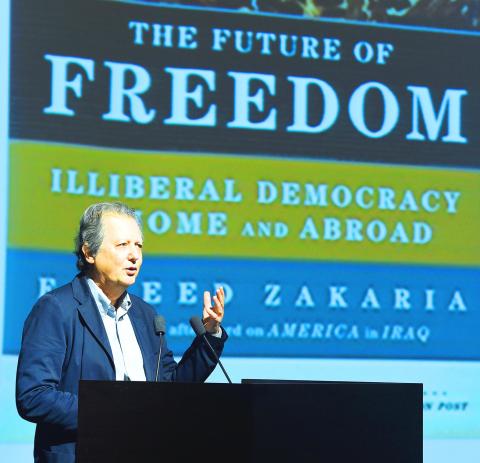The spread of illiberal democracy across the globe coincides with the rise of populist tendencies in many democratic countries, and countries like Taiwan should maintain a vibrant democratic culture, free press and welfare system to resist it, Reporters Without Borders (RSF) chairman Pierre Haski said yesterday.
Haski made the remarks at a forum in Taipei, where he said that there are two kinds of democracies: constitutional democracy and illiberal democracy.
The former ensures individual rights, the rule of law and an independent judiciary, while the latter exhibits patterns of repression while maintaining the appearance of democracy, Haski said.

Photo: Liao Chen-huei, Taipei Times
An apparent rise of illiberal democracy can be observed in the US, France, Hungary, Poland, Turkey, Russia and many other countries, he said.
The “cult of the strongman,” the manipulation of nationalist myth to include a glorious past and xenophobia can be seen across those countries, Haski said.
US President Donald Trump’s “make America great again” slogan or Turkish President Recep Tayyip Erdogan’s boasting about a strong Turkish empire are examples of this, he said.
The Cold War divide between countries and ideologies has been replaced by a new divide in society, with more and more people becoming disenchanted with existing democracy and market systems, Haski said, adding that this was manifest in Brexit, Trump’s victory and the popularity of France’s far-right leader Marine le Pen.
Meanwhile, “China is not in the realm of illiberal democracy. It is not liberal or a democracy at all,” Haski said.
China’s immediate problem is not its undemocratic system, but the nonexistence of the rule of law, he said, citing corruption cases in which village mayors monopolized local land sales and embezzled village funds, but villagers could not obtain help from the judiciary, the media or international organizations.
When asked whether democracy is applicable to China or Asia, with former Singapore prime minister Lee Kuan Yew (李光耀) cited as an example of someone who rejected the Western idea of democracy, Haski said he respects people’s freedom to choose political systems, but the problem is people are not really given a choice at all.
Taiwan has a vibrant democratic culture that could resist illiberal democracy, Haski said.
“Taiwan has made incredible progress in democracy in the sense that it has seen two changes of government in power,” he said. “That’s a lot of democracy happening.”
“The purpose of illiberal democracy is to prevent [those changes].” Haski said. “[Illiberal democracy] has the appearance of democracy but you don’t change the party in power. Taiwan has managed to reach that [democratic] state without too much pain.”
Taiwan is ranked a leading country in press freedom, he said, and although its mainstream media might be controlled by large businesses, a plurality of opinions can be observed on online media, creating a vibrant media culture.

ANOTHER EMERGES: The CWA yesterday said this year’s fourth storm of the typhoon season had formed in the South China Sea, but was not expected to affect Taiwan Tropical Storm Gaemi has intensified slightly as it heads toward Taiwan, where it is expected to affect the country in the coming days, the Central Weather Administration (CWA) said yesterday. As of 8am yesterday, the 120km-radius storm was 800km southeast of Oluanpi (鵝鑾鼻), Taiwan’s southernmost tip, moving at 9kph northwest, the agency said. A sea warning for Gaemi could be issued tonight at the earliest, it said, adding that the storm is projected to be closest to Taiwan on Wednesday or Thursday. Gaemi’s potential effect on Taiwan remains unclear, as that would depend on its direction, radius and intensity, forecasters said. Former Weather Forecast

Taiwanese barista Xie Yi-chen (謝溢宸) recently triumphed at the 2024 World Coffee Championships, taking home 1st place in the World Latte Art category. Xie, 28, impressed the judges in the final round with patterns of a whale, a moose, and a dragon in the three-day competition that took place in Copenhagen, Denmark from June 27-29, clinching the title of latte art world champion during his first time representing Taiwan on the world stage. At a press conference held by the Taiwan Coffee Association on Thursday, Xie said that creating latte art gives him a tremendous feeling of achievement. Speaking about his entries in

TRAVEL CONVENIENCE: The program is to shorten wait times while passing through airport checks and would start for Taiwanese from January next year Japan is to launch a new program to expedite entry procedures for Taiwanese starting from January next year. The Japanese government is planning to introduce new rules to shorten the time it takes foreign travelers to pass through immigration, thereby attracting more tourists to visit, Japanese public broadcaster NHK reported yesterday. An airport preclearance program would be implemented to allow foreign travelers to finish some screenings at their departure airport’s terminals and undergo simple confirmation procedures upon arrival, it said. The program would initially be applied to travelers from Taiwan from January next year and could be extended to travelers from elsewhere depending

The Chinese Communist Party’s (CCP) working group for Taiwan-related policies is likely to be upgraded to a committee-level body, a report commissioned by the Mainland Affairs Council (MAC) said. As Chinese President Xi Jinping (習近平) is increasingly likely to upgrade the CCP’s Central Leading Group for Taiwan Affairs, Taiwanese authorities should prepare by researching Xi and the CCP, the report said. At the third plenary session of the 20th Central Committee of the CCP, which ended on Thursday last week, the party set a target of 2029 for the completion of some tasks, meaning that Xi is likely preparing to